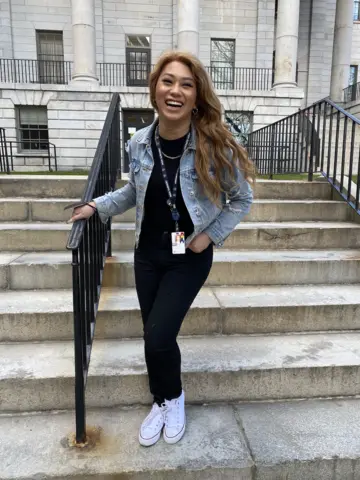Candace Nguyen has a way of making her office, the concrete jungle of Massachusetts General Hospital, a little less gray.
As we looked for a comfortable spot to chat, Nguyen, 29, caught my arm as I tripped over my feet—seconds before I hit the pavement. She exclaimed, “Don’t die on me girl,” and let out a warm laugh encapsulating her kind nature. But it is not just her quick reflexes that make being with Nguyen enjoyable or her laugh that brightens the space around her. She has remarkable, humble confidence, the type that makes you lift your chin a little higher too.

A born-and-raised Bostonian and Vietnamese transgender woman, Nguyen grew up in a working-class home. After embracing her transgender identity through drag performing, her truest passion to this day, she started medically transitioning in 2019.
Nguyen is currently the plastic surgery surgical coordinator at Massachusetts General Hospital (MGH), the largest hospital in the state. In this role, she acts as the bridge between the transgender health and plastic surgery departments, helping transgender and non-binary (TGNB) patients navigate the hospital system as they seek gender-affirming procedures.
In June 2022, Nguyen was awarded the Massachusetts Transgender Political Coalition’s 2022 Gunner Scott Trans Excellence Award, an honor presented to those who have made significant contributions to their community or profession.
With her vibrant personality and list of accomplishments, it is difficult to imagine there was ever a time Nguyen felt lost in her career journey. That is until she described her professional revelation.
Nguyen recalled how she had never traveled past neighboring New Hampshire until November 2020, when she found herself driving down a picturesque Maine road. She was headed to a transgender women of color retreat.
At the retreat, Chastity Bowick, executive director of the Transgender Emergency Fund of Massachusetts, asked, “How many of you have a healthcare provider who is trans?” Few raised their hands. “How many of you want a healthcare provider who is trans?” A sea of hands shot up.
“We don’t have to wait for the next healthcare provider who is transgender,” Nguyen remembered Bowick saying from the front of the retreat’s theater. “We can be that one.”
No one had ever told Nguyen that before. It was exactly what she needed to hear.
The healthcare setting can be a frightening place for the growing TGNB population in the United States, which, according to UCLA’s Williams Institute, includes more than 1.6 million transgender and 1.2 million non-binary individuals. A Center for American Progress survey found that nearly one in two transgender respondents has experienced discrimination from a healthcare provider, one in three had to teach their doctor about transgender people to receive appropriate care, and 54 percent of transgender people of color, in particular, avoided preventative screenings due to discrimination.
However, Anthony Fortenberry, chief nursing officer at the Callen-Lorde Community Health Center in New York City, explained there is something that can make healthcare settings more welcoming of TGNB folks—hiring them. And not just hiring doctors, but all the roles necessary to provide care.
“It is so important to have our patients walk in the front door and see themselves in who is providing their care from the front desk to the pharmacy staff, to the nurses, and providers,” Fortenberry said. “It really makes such a difference if someone feels like they are reflected in the space they are most vulnerable.”
Part of this difference comes in the form of trust and connection. Healthcare professionals do not have to be TGNB to provide quality care to TGNB patients. And health advocates point out that the responsibility to improve TGNB health care is not exclusive to providers who are TGNB. Yet, research shows that patients who share similar racial and ethnic backgrounds with their physicians indicate a more favorable care experience. The same can be expected of the TGNB patient population who can connect with physicians who share their gender identity.
“We definitely see better engagement when people can connect with someone that is of their community in a healthcare setting,” Fortenberry said. “That trust that is so hard to build starts on day one when you have filled your health center with people of the community.”
Transhealth Northampton: Care for the community, by the community
Transhealth Northampton is a unique example of what care for the community, by the community, can look like.
Located in western Massachusetts, Transhealth is the country’s first trans-led, independent, comprehensive, rural transgender health care center. All of its professionals, from physicians to front desk staff, are trans, gender diverse, or allies—as are their patients. The center provides a range of services including primary care, mental health, and gender-affirming hormonal care for patients of all ages and their families.
Mia Lauer is Transhealth’s community engagement specialist and a transgender woman. Her calm demeanor and kind smile are no mask for the dedication she exudes when talking about the “liberating” care that Transhealth provides. While transitioning, Lauer had several doctors misunderstand how her body worked on hormone replacement therapy—a contrasting experience to that of the patients at Transhealth, according to Lauer.
“What we find is that, for the first time, our patients are able to have a normal, healthy relationship with their provider,” Lauer said. She details that this may result from the trans-led staff’s ability to understand and address many healthcare anxieties for TGNB folks. Some of these anxieties include being misgendered or diagnosed with trans broken arm syndrome, when doctors attribute all medical issues, ranging from broken bones to mental health issues and more, to being transgender.
As part of viewing health in a broad context, Transhealth recognizes the need and impact that community has on the lives of TGNB patients—something that hits close to home for Lauer.
“Finding community can be very difficult for trans folks,” Lauer said. “It’s something I struggled with early into my transition and something made even harder by the pandemic.”
This is why facilitating support groups is one of Lauer’s favorite parts of the job. She described that TGNB individuals enter the support groups without knowing anybody who shares their gender identity and leave the group laughing and making plans with TGNB peers. “Getting to see other trans people finding that community through Transhealth is very special to me,” Lauer said.
Transhealth knows they are unique, but they hope the appropriate and dignified care they provide to TGNB folks becomes commonplace.
“One thing we talk about often is working ourselves out of our jobs,” Lauer said. “Not literally, but in the sense that we are not considered revolutionary. We want to change the healthcare system overall.”
She shared that one way to do so is for healthcare providers to hire more TGNB and TGNB people of color, in particular, into existing institutions, bringing their knowledge and experiences with them.
Painting a positive experience
Candace Nguyen is one example of this. “Any bad moment in a trans person’s journey can paint the whole experience for them,” Nguyen said. “If I can be that one person who can paint a positive experience for one trans person in my life, then I know that I have made it.”
As the plastic surgery surgical coordinator at MGH, the only trans person of color, and one of two Asian folks in either of her departments, Nguyen plays a critical role in easing her patients’ worries. As part of her daily tasks, she teaches folks how to use hormone treatments, makes inquiries to insurance companies about procedure coverage, and answers patient questions.
She does not disclose her trans identity to every patient, but to those who have questions or trust issues with the medical system, Nguyen empathizes and shares her experiences undergoing some of their same procedures. This ability to relate, she says, visibly reduces her patients’ anxiety.
Nguyen’s impact extends beyond her patients to parents and co-workers. On the phone, she often answers the questions of parents whose child is undergoing a gender-affirming procedure or offering to pay for such. While sometimes parents cross boundaries in these conversations, such as asking for intimate details of her transition, she knows most of the time it is done out of ignorance.
“If I can help that parent be a better parent, and they are already being a great parent for calling on behalf of their child, that is just amazing,” Nguyen said. “We need more of that.”
In the same vein, Nguyen leads many of the cisgender, heterosexual staff in her departments to tap into the emotional side of the job, including helping them to understand how to compose themselves when caring for a frustratingly eager patient. She reminds them that patients have likely been waiting a very long time for these procedures. During Nguyen’s first week of work, she met a patient who had waited 30 years to undergo bottom surgery, a procedure that enables patients to have genitalia that aligns with their gender identity. While her team often deals with the business side of surgery, Nguyen said, “I have made strong connections for people to care for someone like me.”
It was not easy for Nguyen to reach her current position at MGH.
At the time she attended the trans women of color retreat, she worked as a Massachusetts Department of Public Health clinical coordinator at Fenway Health, a community health center. She was beginning to burn out when a mutual friend encouraged her to apply for MGH’s plastic surgery surgical coordinator position.
Despite her desire for something new, Nguyen was scared. “Can I even stand next to these doctors?” she questioned.
At Fenway Health, Nguyen was close to her team, but the situation fueled her imposter syndrome; she worked mainly with men who held advanced degrees. “Even though I had experience, I never felt good enough,” she said.
Through pursuing a bachelor’s degree in Asian American Studies and volunteering throughout high school as a peer educator at the Boston Alliance of Gay, Lesbian, Bisexual, Transgender Youth, Nguyen strengthened her ability to provide health education to patients, effectively communicate with providers, and more. Yet, despite her qualifications, both in lived experience and professional skills, Nguyen described her feelings of ineptitude as overwhelming.
But Bowick’s words constantly circled her mind, “We don’t have to wait for the next healthcare provider who is transgender, we can be that one.”
She took the job.
Building a pipeline of healthcare professionals who are TGNB
A lack of advanced education was a mental hurdle Nguyen had to tackle to ultimately accept the MGH position and advance in her career. And Nguyen is not alone. Dr. Asa Radix, an expert in transgender medicine, explained a lack of early education can be a barrier to entering medical school or pursuing other healthcare professions.
“If you don’t finish high school, you aren’t getting into college. And if you don’t finish college, you aren’t getting into medical school,” Radix said. “I see super smart folks who are trans who just never had an opportunity because they were homeless, their parents kicked them out, or they didn’t finish school. All of those things have to be fixed first in order for people to be successful.”
The National Center for Transgender Equality reports that transgender adolescents comprise 20-40 percent of the U.S. youth homeless population due to a host of factors like family rejection and discrimination. And the Gay, Lesbian, and Straight Education Network finds a hostile school environment and its impact on student academic performance and mental health can also increase the chances of transgender teens missing school or dropping out.
J.M. Jaffe is working to break down the educational barrier. Jaffe is the executive director of Lyon-Martin Community Health Services in San Francisco, the founder of Trans Health Consulting, LLC, and a non-binary trans masculine person with expertise in advancing trans health efforts at the organizational and policy level. Lyon-Martin is a community clinic that provides care to TGNB, gender non-conforming, and intersex communities and cis-gender women with specific sensitivity to LGBQA sexual orientation, disability, size, race, ethnicity, and language regardless of immigration status or ability to pay.
Jaffe is building a pipeline of healthcare professionals who are TGNB by running the QTI BIPOC Healthcare Fellowship at Lyon-Martin—a workforce development program without educational requirements.
“Hiring someone straight out of the community, without any degree, they actually bring so much more knowledge and ability to relate to our community members than someone who went to school, is not from the community, and has no real-life experience,” Jaffe said.
Launched in April 2022, the program hires Black, Indigenous, and people of color who are queer, trans, gender non-conforming, and/or intersex and interested in entering the healthcare field. Fellows embark on six-month, paid medical assistant fellowships that provide training, clinical experience, and job or school application assistance.
The QTI BIPOC Healthcare Fellowship is the first of its kind. Adding to its uniqueness, during the program, fellows work alongside trans health professionals at Lyon-Martin and are mentored by providers who aretransgender.
In hiring healthcare professionals who are TGNB, Jaffe discussed the importance of taking care of and enabling these individuals to care for themselves, given the likelihood of transference of trauma when interacting with patients of the same gender identity.
“Burnout is so real when you are taking care of your own community,” Jaffe said.
Anthony Fortenberry is also working to build a pipeline of healthcare professionals who are TGNB at Callen-Lorde, a community health center that provides care to New York City’s LGBTQ communities regardless of their ability to pay.
As the chief nursing officer at Callen-Lorde, Fortenberry is heavily informed by his time spent in an NYC emergency room as a nurse and gay man. He has helped to oversee the adult workforce development program at Callen-Lorde, which at its height employed 20 individuals.
The workforce development program recruits interested patients who have been living with HIV, some who are TGNB, and have successfully navigated the complex care system and partners them with someone newly diagnosed.
Beyond assisting new patients through the care system, the peer navigators engage in group education sessions to strengthen their communication and public speaking skills. Additionally, the program hosts career development clinics complete with mock interviews and resume workshops for patients and peers. Although it was halted because of COVID-19, Fortenberry intends to resume the program before the end of 2022.
For every dollar the typical worker earns, the Human Rights Campaign reports that trans men and non-binary individuals make 70 cents and trans women make 60 cents, with trans people of color, in particular, faring even worse. To combat this wage gap, Fortenberry noted the program offers participants a source of income and opportunities for professional growth. It also provides a safe working environment.
In the most recent 2015 U.S. Transgender Survey, 30 percent of respondents reported being fired, denied a promotion, verbally harassed, or sexually assaulted at work due to their gender identity. In the only study of its kind, Dr. Radix and colleagues found that TGNB medical students and physicians face barriers on the basis of their TGNB identity when applying to training programs or jobs and witness the discriminatory treatment of TGNB patients and colleagues. Such factors led 78 percent of respondents to censor themselves to avoid disclosing their identity.
Fortenberry witnessed such transphobia and homophobia amongst colleagues while working in the emergency room. He also knows people who have been misgendered or deadnamed during the employment process.
“In the same way that healthcare providers must provide a safe, supportive, and inclusive environment for all patients, employers must do the same,” Fortenberry said.
For the future
Nguyen plays a critical role in her departments, but as Gray Babbs, a doctoral student at Brown University’s Health Services, Policy, and Practice program explained, hiring one healthcare professional who is TGNB is not a panacea to the institutional discrimination that patients and healthcare professionals who are TGNB face.
Babbs explained that the critical roles healthcare professionals who are TGNB play in healthcare settings can also be associated with “a great deal of stress related to constant education, workplace microaggressions, and structural inequity.” To this end, he raises the question: How can healthcare professionals who are TGNB best be supported once they break into the ivory towers that are medical institutions?
Supported by her personal and professional networks, advancement is now on Nguyen’s mind as she eyes a managerial position at the hospital and a spot on the televised drag competition "Ru Paul’s Drag Race." She is also considering returning to school to become a therapist or pursue a master’s degree in social work.
Outside of the hospital, Nguyen is paying her opportunity forward. In her free time, she speaks to university students about her gender journey and intersectionality, serving as the representation in healthcare that many TGNB people do not have.
“Remember that there will be people who love you, and there will be people who dare not to love you,” Nguyen tells the students. “Lead with your head held high, and know that you're simply mighty just for being yourself; and know how much impact you will be making just based on being there. Your presence can be intimidating, but also can be very honored.”
Editor's note, August 4, 2022: This article was modified, at the request of the author, to say that persons are transgender and non-binary, not that they identify as transgender and non-binary.











